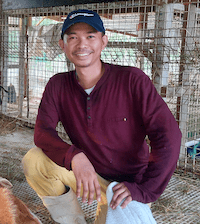The Department of Agriculture (DA) confirmed on Friday the first case of Q fever in the Philippines, a zoonotic disease that is transmissible to humans. Q fever, also known as query fever, is caused by the bacterium Coxiella burnetii. It affects a wide range of animals, including goats, sheep, and cattle, with goats being particularly susceptible. The disease is primarily transmitted through inhalation of aerosols contaminated with the bacterium from birth products like the placenta and amniotic fluid, as well as urine, feces, and milk.
Humans can also contract Q fever through the same routes, particularly those who work closely with livestock or live in rural areas, which is relevant for many agricultural communities in the Philippines. In goats, Q fever often goes unnoticed as many infected animals do not show obvious symptoms. However, when symptoms do appear, they can include late-term abortions, weak or stillborn kids, and sometimes fever, lethargy, and loss of appetite.
The DA’s Bureau of Animal Industry (BAI) reported detecting Q fever in some animals at a government breeding station in Marinduque. After conducting polymerase chain reaction tests on blood samples of suspected infected animals, BAI confirmed the Q fever and culled over five dozen goats imported from the United States. These goats were bought for a dispersal program for farmers.
Diagnosing Q fever in goats involves:
- Serological Tests: ELISA to detect antibodies against C. burnetii.
- PCR (Polymerase Chain Reaction): To detect bacterial DNA in birth products, milk, or other samples.
- Histopathology: Examination of aborted fetuses and placenta for characteristic lesions.
Preventing and controlling Q fever in goats involves several measures:
- Hygiene Practices: Proper disposal of birth products, good ventilation, and regular cleaning to reduce environmental contamination.
- Pasteurization: Pasteurizing milk to kill the bacterium.
- Vaccination: In some regions, vaccines are available for animals, though their use and availability can vary.
Agriculture Secretary Francisco Tiu Laurel Jr. directed the immediate condemnation of all infected goats and animals exposed to the infected ruminants, the tracing of potentially infected animals, and a temporary ban on the importation of goats from the U.S. Laurel emphasized the seriousness of the situation and assured the public that the DA would take all necessary measures to ensure public health is not compromised. The agriculture secretary also ordered the preventive suspension of certain BAI personnel pending investigation, a review of BAI’s quarantine and disease control protocols, and potential blacklisting of the importer of the infected goats.
For public health, Q fever poses a significant risk, especially to farmers, veterinarians, and slaughterhouse workers. In humans, the disease can cause acute febrile illness, pneumonia, hepatitis, and in chronic cases, endocarditis. Additionally, two dozen imported goats left in the quarantine facility in Pampanga were also culled to eliminate any possible source of Q fever infection.
Dr. Christian Daquigan, OIC-chief of BAI National Veterinary Quarantine Services Division, explained that Q fever is a widespread zoonotic disease caused by the bacterium Coxiella burnetii and poses a public health concern as it can be transmitted to humans through contact with infected animals or their excreta and body fluids. Dr. Daquigan assured that the BAI is actively addressing reported cases and taking decisive measures to contain the disease. BAI is conducting extensive surveillance in the affected areas to identify and manage any new cases promptly and has directed the procurement of additional PCR reagents for emerging and re-emerging animal diseases.
Public health measures in the Philippines should include controlling infection in animal populations, educating at-risk groups, and monitoring and managing outbreaks to prevent the spread of Q fever. Q fever outbreaks can occur when there are high densities of livestock and poor biosecurity measures. Notable outbreaks have happened in various parts of the world, including significant incidents in the Netherlands.
In the Philippines, similar conditions could potentially lead to outbreaks if preventive measures are not in place. Ongoing research aims to improve vaccines for both animals and humans, enhance diagnostic tools, and better understand the ecology and evolution of C. burnetii to manage infections more effectively. Understanding Q fever and its implications is crucial for maintaining animal health, agricultural productivity, and public health in the Philippines.
With proper preventive measures and awareness, the impact of this disease can be minimized.

Mr. Jaycee de Guzman is a self-taught agriculturist and the founder and patriarch of Alpha Agventure Farms, recognized as the leading backyard farm in the Philippines. With a rich background in livestock farming dating back to the early 1990s, Mr. de Guzman combines his expertise in agriculture with over 20 years of experience in computer science, digital marketing, and finance. His diverse skill set and leadership have been instrumental in the success of Alpha Agventure Farms.


